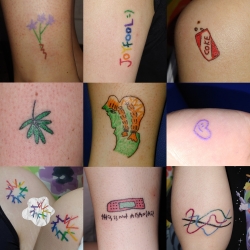
Unlike in the past, the perception surrounding tattoos have changed drastically. People are beginning to see tattoos as a unique way to express themselves. However, it might come as a surprise when it is said that only tattoos conducted by medical workers are considered as ‘legal’ in Korea.
Her Soo-kyung, a novice tattoo artist who is currently a student in Ewha majoring business administration and art history, emphasizes the change of perception towards tattoos.
“In the past, many people had biases on tattoos. They had the prejudice that people with tattoos were intimidating gangsters,” she said.
“But, gamsung tattoos, fashion tattoos and black and gray tattoos are trending among young people, leading to the new viewpoint that tattoos can be cute, small and beautiful. I believe that the increase of tattoos among celebrities was one of the reasons why tattoos became popular.”
Tattoos, are forms of artwork that represent the individual where hundreds of diverse genres exist to cater for this unique expression. Today, tattoos are so common to the extent that they are as common as earrings and piercings, with one important difference - their permanence. Despite the growing interest in tattoo art they are still not universally accepted because of historical criminal links.
“It will take much more time for tattoos to become universal since we were not familiar with them in the recent past. I believe I am standing on the brink of change. Just like there is the 70s’ bias for short skirts are gone, tattoos will be considered natural someday in the future,” Her said.
Despite their mainstream position in popular culture, tattoos created by tattooists who are not medically certified are still considered illegal by Korean law. Today, there are only ten medical workers who are tattooists, yet over one million people in Korea have tattoos.
The regulations surrounding tattoos in Korea are in disorder. According to Her, tattoos and their legality are based on a judicial precedent made in 1994 and have not been changed despite tattoos becoming prevalent in Korean society. Further questions and confusion arose when government support was given to two Korean tattooists after winning international tattoo competitions.
“The contradiction of the culture and the law is constantly leading to the fall of awareness of tattoos,” Her said.
Unclear regulations in Korea are also causing headaches for tattooists as they try to navigate this tricky grey area in Korean society. Artist copyright is at the center of this conversation.
“Copyright issues regarding tattoo designs are crucial. Customers sometimes take designs from tattoo artists without consent and take it to other tattoo artists as though it is their own drawing,” Her said. “In order to prevent such situations, I make sure the customers agree with the procedure by utilizing a treatment consent. Even though it is complicated for tattoo artists, we need to do our best in the current unavoidable situation.”
Tattoos and their place in Korean society face a long and laborious road to both acceptance and legalization. Tattoo artists in Korea, like Her, are now bonding together by forming artist unions to push against the grain of negative stereotypes and traditional attitudes so they can finally practice their passions with acceptance and legality.

